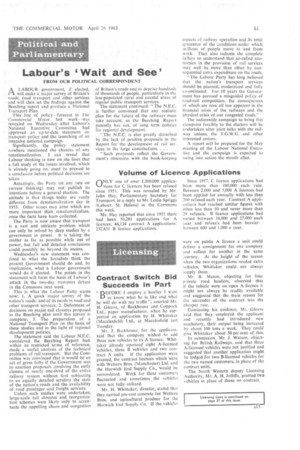Labour's 'Wait and See'
Page 15

If you've noticed an error in this article please click here to report it so we can fix it.
FROM OUR POLITICAL CORRESPONDENT
A LABOUR government, if elected, E-1 will make a major survey of Britain's roads, road transport and other services and will then set the findings against the Beeching report and produce a National Transport Plan.
This line of policy—forecast in The Commercial Motor last week—was revealed on Wednesday after Labour's National Executive Committee had approved an up-to-date statement on transport policy and the launching of an intensive national campaign.
Significantly, the policy statement nowhere mentioned the chances of any renationalization, 1 can reveal that Labour thinking is now on the lines that a full study of the issues involved, which is already going on, must be pressed to a conclusion before political decisions are taken.
Amazingly, the Party (at any rate on current thinking) may not publish its intentions before a general election. The attitude is that things today are vastly different from denationalization day in 1953. Other issues may arise which are more important than rcnationalization, once the facts have been collected.
The Party is now aware that transport is a vast and intricate problem which can only be solved by deep studies by a government in power. It is taking the matter as far as possible while out of power, but full and detailed conclusions could possibly be beyond its means.
Wednesday's new statement was confined to what the Socialists think the present Government should do and, by implication, what a Labour government would do if elected. The points in the statement will form the basis of Labour's attack in the two-day transport debate in the Commons next week.
This is what the Labour Party wants now: 1. A quick major survey of the nation's roads: and of its needs in road and other transport services; 2. Deferment of decisions on major rail closures proposed in the Beeching plan until this survey is complete; 3. The preparation of a National Transport Plan on the basis of these studies and in the light of regional development policies.
The statement said the Labour N.E.C. considered the Beeching Report had, within its restricted terms of reference, made a useful analysis of the technical problems of rail transport. But the Committee was convinced that it would be an act of gross folly if the Government was to sanction proposals involving the early closure of nearly one-third of the entire railway system without first subjecting to an equally detailed scrutiny the state of the nation's roads and the availability of road passenger and freight services. Unless such studies were undertaken, large-scale rail closures and reorganization schemes were likely only to accentuate the appalling chaos and congestion of Britain's roads and to deprive hundreds of thousands of people, particularly in the less-populated rural and coastal areas of regular public transport services.
The statement continued: "The N.E.C. is further convinced that any realistic plan for the future of the railways must take account, as the Beeching Report patently has not, of long term policies for regional development.
"The N.E.C. is also greatly disturbed by the lack of positive proposals in the Report for the development of rail services in the large conurbations. . .
"Such proposals reflect the Government's obsession with the book-keeping aspects of railway operation and its total ignorance of the conditions under which thlilions of ,people 'move to and from work. They also indicate the complete failure to understand that -so-called economies in the provision of rail services may well be more than offset by consequential extra expenditure on the roads.
"'the Labour Party has long believed that the nation's transport services should be planned, modernized and fully co-ordinated. For 10 years the Government has pursued a misguided policy of road-rail competition, the consequences of which are now all too apparent in the financial crisis of the railways and the physical crisis of our congested roads."
The nationwide campaign to bring this viewpoint forcibly to the electors will be undertaken after joint talks with the railway unions, the T.G.W.U. and other interested unions.
A report will be prepared for the May meeting of the Labour National Executive and the campaign is expected to swing into action the month after.












































































































